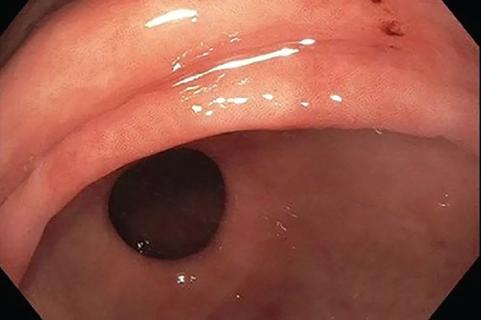Customized interventions for GI disorders are enhancing patient outcomes

Due to his background in primary care, Stephen Lupe, PsyD, was familiar with the medical home model and its emphasis on coordinated, comprehensive and accessible care. In 2019, Miguel Regueiro, MD, Chief of Cleveland Clinic’s Digestive Disease Institute (DDI) hired Dr. Lupe to DDI as a behavioral health specialist to work specifically with patients with inflammatory bowel disease (IBD).
Advertisement
Cleveland Clinic is a non-profit academic medical center. Advertising on our site helps support our mission. We do not endorse non-Cleveland Clinic products or services. Policy
Five years later, the department now boasts three behavioral health specialists and two postdoctoral fellows, and it plans to expand even further in the next few months.
Dr. Lupe and the other GI behavioral health specialists work closely with the GI medical teams to provide comprehensive care to patients with IBD, bariatric disorders, gynecologic/GI disorders and more. Their treatment strategies include psychoeducation, cognitive behavioral therapy and gut-directed hypnosis among others, and every aspect of care is individually tailored to each patient’s needs.
“We believe we are the only GI department in the country with a dedicated section for behavioral health, and it’s been an incredible asset for us,” says Michelle Kim, MD, PhD, Chair of the Department of Gastroenterology, Hepatology and Nutrition at Cleveland Clinic. “Whether it’s through improving adherence and compliance with medications, reducing stress or teaching patients techniques to help cope with some of the issues they’re dealing with, there are several ways our behavioral health specialists have supported our mission and improved patient care.”
“When we were creating this program, the goal was to have our patients see a behavioral health specialist at the same time they saw their physician,” explains Dr. Lupe. “So, for example, a patient is diagnosed with Crohn’s disease. After they get the diagnosis, I would go in right after they’ve met with their gastroenterologist, and I’ll chat with the patient. Then our nutritionist would go in after me, and so the patient was assessed by their entire care team during the same visit. This went over very well with our patients.”
Advertisement
Originally, Dr. Lupe was the only behavioral health specialist for the entire GI department, which meant he handled all of the Clinic’s Ohio and Florida patients with IBD. About two years later, Madison Simons, PsyD joined the team, and her focus has been on the overlap between gynecological and GI care as well as disorders of GI motility like gastroparesis and IBS. Erika Staneff, PsyD, came on shortly after, and she specializes in the bariatric endoscopy population with an interest in the psychological aspects of hunger.
Dr. Lupe says that the services his team provides are dependent on what each patient needs. Some patients may benefit from just one meeting, while others may benefit from multiple meetings. The team has also expanded care by partnering with a digital care platform, which provides digital dietary and behavioral health interventions. He notes that the important thing is getting the right patient to the right level of care. But because the behavioral health specialists are a permanent part of the patient’s care team, the patient can always go back to them if things change, or if they decide they could benefit from additional meetings.
“A lot of my work is framed around changing the relationship patients have with their thoughts and emotions, and increasing the activation of the rest and digest nervous system,” says Dr. Lupe. “Essentially what we’re providing is skill training. But we’re also building rapport and trust with our patients to get a better understanding of how we can help them. For some patients, maybe just educating them about the brain-gut connection and eating behaviors is enough. I have other patients who suffer from anxiety related to their IBD. They’re afraid to go out or change their routine because they’re nervous about when they’ll need to use the bathroom. Others may just need a place to help process things, and we can help with that too.”
Advertisement
Dr. Lupe says that his primary training is in a newer approach called acceptance and commitment therapy. He says it has worked well in helping patients learn to change their relationship with their thoughts by recognizing the differences between thoughts and reality. Cognitive behavioral therapy is another tool he uses, and he has other patients who have benefited greatly from gut-directed hypnosis.
He explains that a typical hour-long session may involve spending 25 minutes talking about a patient’s thoughts and their relationship with those thoughts. Then, they’ll work on challenging and reframing those thoughts. For patients who could benefit from gut-directed hypnosis, they’ll spend the next 20 minutes working on deep-relaxation strategies.
“This set-up works well because after spending the first 25 minutes going over their anxieties, patients are understandably anxious at this point,” explains Dr. Lupe. “So by going straight from feeling anxious to employing and teaching them these relaxation strategies and using things like diaphragmatic breathing, patients can see in real-time how these tools can help alleviate that anxiety.”
He continues, “We also use this with patients apprehensive about upcoming surgeries. We work to reframe their thoughts so as not to focus on their fear but instead look at how that surgery could help them and improve their health and how their life might benefit.”
The GI psychologists are in constant communication with the rest of the department, and Dr. Lupe believes that those interpersonal connections allow the patient’s care team to continuously and holistically evaluate patients.
Advertisement
“I see our GI specialists every day,” says Dr. Lupe. “We're in the same space, and I make it my business to make sure I see our medical staff as much as possible. That changed during the COVID-19 pandemic, and we had to pivot to a referral-based model. I still see many of my patients virtually, but now that we’re back in the office, I’m able to chat with our GIs, our nutritionists, our lab techs and the other GI psychologists, and this helps us stay up-to-date on our patients need and makes sure that we’re all on the same page.”
Dr. Kim echoes these feelings from the clinical perspective. “Our behavioral health specialists complement what we’re doing medically with what they’re focusing on in terms of behavior,” she says. “They’ve helped us develop a clinical portfolio, and we’ve been pleased with the growth of that team. In addition to patient care, the section also focuses on research, which is an area where we’re looking to grow.”
By having regular conversations with patients, the behavioral health specialist team gains more insight into what their patients are dealing with. Having the resources available to them at Cleveland Clinic also allows the team to develop and lead research projects to advance that understanding even further. For example, Dr. Simon’s work with her patients led to research exploring the connection between GI symptoms and endometriosis.
“My goal is for every single department at Cleveland Clinic to have a behavioral health provider,” says Dr. Lupe. “I think this setup is good for providers because it decreases burnout by dispersing responsibilities across the team. Just as important, it's better for patients.
Advertisement
He continues, “I think the model we’ve developed in GI can easily be expanded to other specialties, and that’s crucial because when we specialize in psychology, we can become experts in those areas. We can be the ones doing the research, publishing that research and advancing care. Simply put, we feel that this is how we should provide care, and our patients have demonstrated that they agree.”
Advertisement

Greater awareness among young patients is needed

Careful risk stratification is key

A three-step plan aimed at strengthening the institute’s infrastructure includes a renewed focus on mentorship

Hard-to-treat GI disorders benefit from multidisciplinary approach

Common motility issues, indications for testing, and when to refer your patient

How wellness habits help nurses flourish

Study shows short-term behavioral training can yield objective and subjective gains

A closer look at current uses and future opportunities